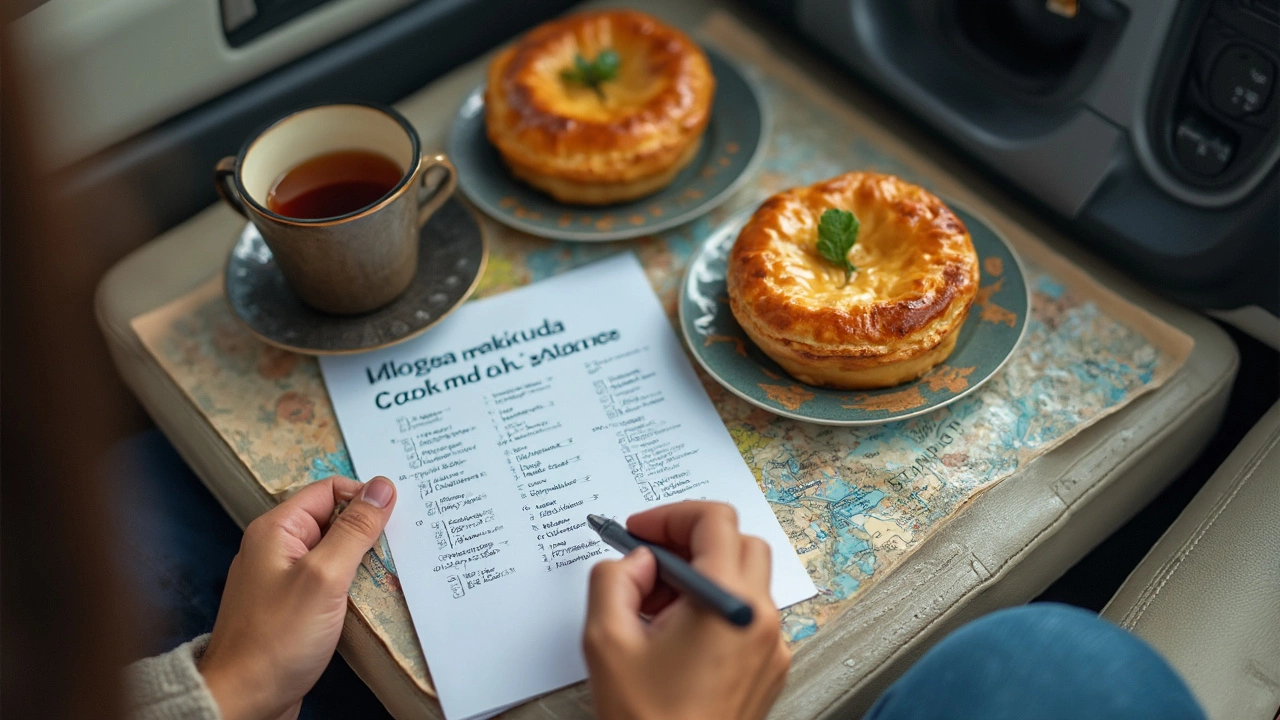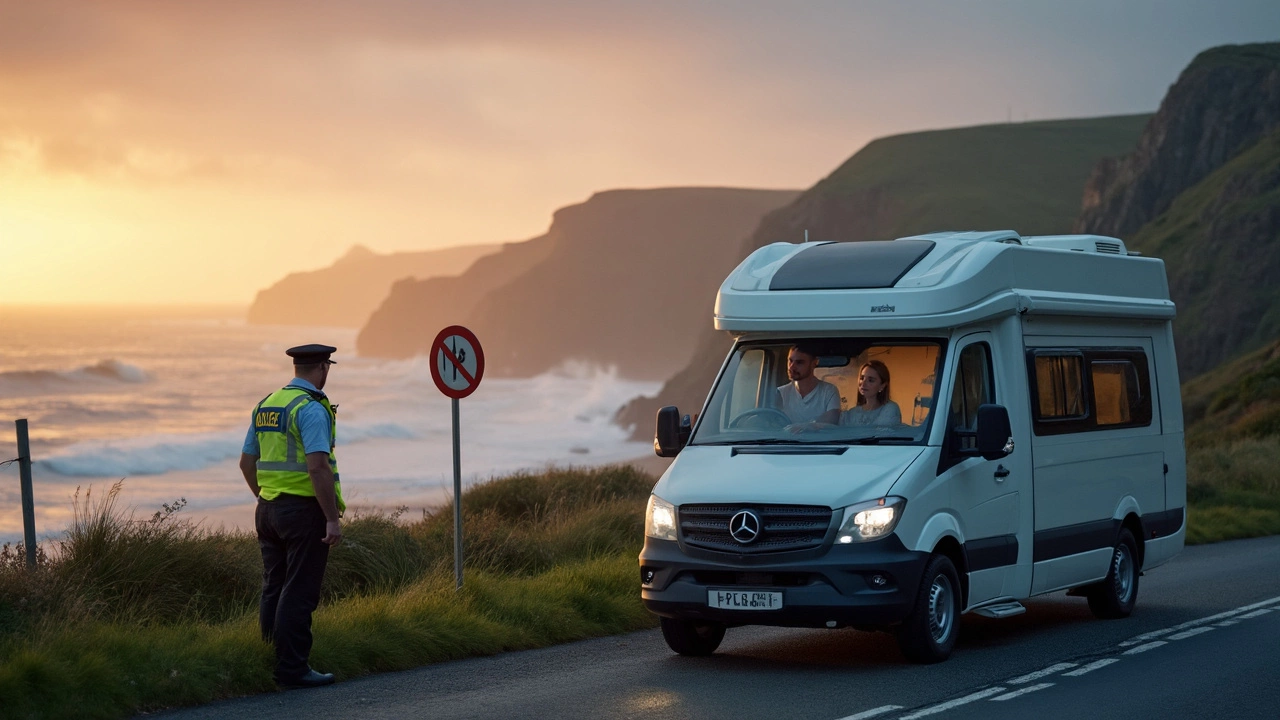Imagine you just want to park by the ocean, crack open a cold drink, and fall asleep to the sound of waves. Sounds perfect, right? But in some states, that dream might score you a hefty fine or worse—an early wakeup call from a police officer tapping your window.
Beach boondocking means camping without services, usually for free and without a reservation. The catch? Plenty of states, especially those with crowded or high-value coastlines, say "nope" to overnight parking along their beaches. Laws aren’t always straightforward, either—some places let you day park but kick you out after dark, others force you into packed and pricey campgrounds.
It’s not just about state laws. Local ordinances, county rules, and even weird city quirks mess with where you can spend the night. One spot might look empty, but a tiny sign could make overnight stays totally illegal. So, you’ve got to be sharp about where you park if you don’t want to ruin your trip with fines or even a tow.
- Boondocking: The Basics and Gray Areas
- States That Ban Boondocking on Beaches
- Common Traps and Local Crackdowns
- Smart Tips to Camp Without Trouble
Boondocking: The Basics and Gray Areas
Boondocking is basically camping out in your RV or van with no hookups—no power, no water, and usually no official amenities. For beach campsites, that means parking as close to the sand as you can get, usually for free. Sounds simple, but there are a lot of rules and legal blind spots that can get folks in trouble if they’re not careful.
At its core, boondocking is all about staying in places not meant for overnight camping. Federal lands like Bureau of Land Management (BLM) and some National Forests are famous for allowing it, especially out West. But when it comes to beaches, rules change fast. In Florida, for example, almost every beach is off-limits for overnight parking—even if you’re just napping in your rig. California has thousands of miles of coast, but almost every public beach bans overnight parking unless you’re in a county or state park with a legit campsite.
Things get messier because laws often overlap. You’ll see spots where the state says day use is fine but local towns ban overnight stops. Sometimes, different sections of the same beach have different rules! Here are some gray areas people run into:
- Unmarked lots – Looks empty, so you think you’re good. Turns out local police patrol it after dark.
- Rest areas – Some states say you can sleep here, but others limit your stay to a few hours and ban sleeping.
- Private roads or beachfronts – Looks public, but it’s actually private property and subject to towing.
- Parking lots near the beach – Many have "no overnight" signs, but some small towns quietly let boondockers stay to boost tourism.
Take a look at this quick table to see how different spots treat boondocking:
| Type of Land | General Rule | Typical Enforcement |
|---|---|---|
| State Beaches | No overnight stays unless in paid campground | High: Rangers and local police patrol |
| National Forests (inland) | Usually allowed, away from marked campgrounds | Medium: Spotty enforcement |
| BLM Land (non-coastal) | Usually allowed, far from the beach | Low: Not much enforcement |
| Rest Areas | Varies by state—some limit time, others allow sleeping | High: States like Florida and California enforce time limits |
If you’re starting out, always check for signs and use apps like Campendium or iOverlander to see what others have reported. The biggest takeaway? Just because you see another RV parked late doesn’t mean it’s legal—sometimes people are just risking it.
States That Ban Boondocking on Beaches
Here’s the tough part—beach boondocking is a hard no in a handful of states. California, Florida, New Jersey, and Hawaii are the biggest on this list. You’ll spot "No Overnight Parking," "No Camping," or "Closed After Sunset" signs on most public beaches. Cops and rangers enforce these rules year-round, especially during busy seasons.
Let’s look at some state realities:
- California: Known for beautiful beaches but harsh about overnight parking. State Parks and most city beaches post and enforce strict bans. RVs lined up on Pacific Coast Highway won’t last the night. Los Angeles County, for example, will ticket and tow vehicles after midnight even in remote lots.
- Florida: Nearly all Atlantic and Gulf Coast beaches don’t allow any overnight camping or parking outside designated campgrounds. Even smaller cities like Clearwater and Miami Beach have local rules, heavy patrolling, and quick citations.
- New Jersey: Every single shore town bans sleeping overnight on public beach property. Local police patrol with a "zero tolerance" toward vehicles in beach lots post-sunset.
- Hawaii: Beaches are public, but all counties ban overnight vehicle stays. Police are known to wake and ticket people sleeping in cars or RVs pretty much anywhere on Oahu, Maui, Kauai, or the Big Island.
Narragansett, Rhode Island and Galveston, Texas, also don’t allow it, and many Oregon and Washington beach towns have recently tightened their rules to keep RVs out overnight.
Here’s what the folks at the U.S. National Park Service said about the trend:
"Beach camping restrictions are increasing, especially in states where public demand is highest. Always check for signage or local ordinances, even if the beach looks empty."
If you’re more of a data-nerd, here’s a quick comparison table of famous beach states and their rules:
| State | Overnight Beach Parking Allowed? | Typical Fine | Notes |
|---|---|---|---|
| California | No | $100 - $250 | Parks and local police enforce hard |
| Florida | No | $75 - $200 | Enforced even at small beaches |
| New Jersey | No | $50 - $200 | All public beaches, strict and relentless |
| Hawaii | No | $100 - $500 | Statewide enforcement, especially for vans and RVs |
| Oregon | Mostly No | $75 - $250 | Pockets of legal camps, most urban beaches ban it |
If you roll up on a beach with an empty lot, don’t celebrate just yet—signs sometimes change overnight, and what’s OK in winter might be a huge fine in summer. Always double-check online rules and scan for any signs before you even think about staying the night.

Common Traps and Local Crackdowns
Every seasoned beach camper knows this: laws might look straightforward online, but once you hit the road, local crackdowns toss a wrench into your plans. California and Florida are classic examples. On the map, there are big stretches of coastline that seem perfect for boondocking, but local sheriffs and rangers are always patrolling for campers breaking no-overnight laws. In Los Angeles County, even parking for a late-night surf session can get you a ticket. Down in Miami-Dade, RVs parked along public beaches get towed almost every weekend.
Don’t trust maps that highlight "public access" without checking for extra rules. Many cities—think Myrtle Beach, South Carolina—have tiny posted signs saying “No Overnight Parking.” These aren’t just warnings; local police will enforce them, especially after midnight. And don’t get comfortable just because you see other vans or motorhomes camped out. Locals sometimes report unfamiliar vehicles, and police have been known to sweep whole lots late at night.
- Be extra careful with state parks and protected dune areas. Many have land that looks remote but is covered by strict rules; fines for illegal camping in protected beach zones can go over $300.
- Beach parking lots at state parks or city beaches often allow vehicles until sundown, then switch to tow-away status—sometimes at 10 p.m. sharp, with no leeway.
- Even places that allow overnight parking may ban setting up chairs, grills, or awnings. It can count as "camping," triggering a violation even if you stay in your RV.
- Don’t ignore private property, even if the lot looks abandoned. Coastal landowners often call in complaints, and trespassing charges stick quickly along the beach.
If you get stuck, don’t argue with law enforcement. Polite questions about legal places to camp often score better results than excuses. If a beach seems too perfect and empty, it might be that everyone else got chased off already. When in doubt, call the town police or ranger station before settling down for the night.
Smart Tips to Camp Without Trouble
If you want to skip hassles, here’s what actually works when you’re boondocking near beaches—especially in those states or towns that are strict about it. Always double-check signs, and don’t bank on what you read online—local rules change a lot, and some places crack down harder every summer.
- Boondocking is easiest when you stop before dark, blend in, and don’t set up like you’re building a base camp. Keep your awnings in, don’t put out chairs, and look like you might just be resting for a few hours.
- Use official apps or websites. The NOAA, National Park Service, and state park websites often post real-time rules and tips. Also, iOverlander and Campendium show user-reported updates—locals will mention if cops sweep spots like Santa Monica or Myrtle Beach.
- Watch for "No Overnight Parking" or "No Camping" signs. In California, Florida, and New Jersey, these are common right by the best beach accesses. If there’s no sign but you’re unsure, ask a lifeguard or local worker—don’t risk it.
- If you get the dreaded midnight knock, be polite and move immediately—arguing will not help. Most of the time, police just want campers gone by morning and won’t ticket you if you split fast.
- Don’t dump tanks, leave trash, or make noise. A bad apple ruins it for everyone, and tons of places have lost overnight privileges due to RVers leaving a mess.
| State | Estimated Fine Range |
|---|---|
| California | $75 - $250 |
| Florida | $50 - $200 |
| New Jersey | $100 - $500 |
| Texas | $75 - $150 |
| Oregon | $120 - $300 |
If you’re flexible, look for alternatives: rest stops are usually good for one night in states like Texas, but not in California (most posted 8-hour limits now). Some local Walmart or Cracker Barrel lots still allow overnight parking, but call ahead—rules change a ton by city.
"The best advice for beach campers is to stay low-key, follow every sign, and keep it clean. More and more beaches are losing access to free campers each year because people break the rules," says Chris Walker, editor at RV Travel Magazine.
And here’s a tip from me: if I’m somewhere new with my kid Renly, I always have a quick backup plan—like a 24-hour gas station nearby. It’s way better to move in the middle of the night than wake up to a tow truck.
